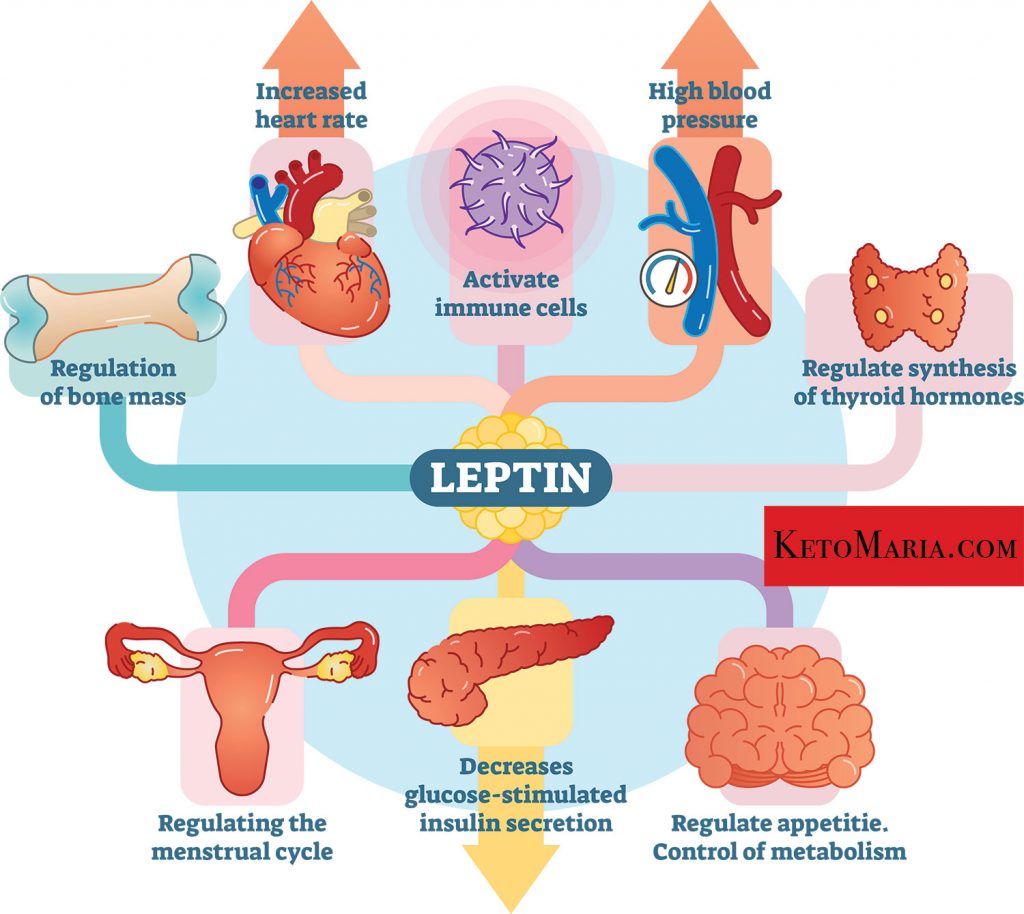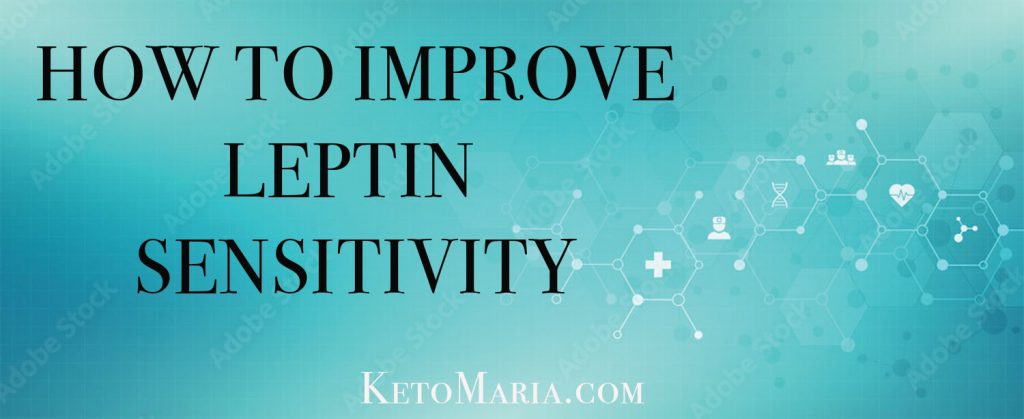 Did you ever wonder why it is easier to gain weight than keeping it off?
Did you ever wonder why it is easier to gain weight than keeping it off?
The key to this is in the fat cells where a powerful hormone is produced called leptin. Leptin signals the brain to regulate the metabolism in order to store or burn fat.
Leptin is a hormone produced by fat cells that helps regulate appetite and energy expenditure. When leptin levels are high, it signals to the brain that the body has enough energy and can stop eating. However, when the body becomes resistant to leptin, this signaling system breaks down, leading to increased appetite and decreased energy expenditure. In this blog post, we will discuss some tips on improving leptin sensitivity.

WEIGHT LOSS STRUGGLES
85% of people who lose weight end up regaining weight because the “metabolic thermostat” of the body, leptin, is reset upward automatically. When people lose weight, leptin production decreases, which causes people to regain the lost weight. This protein hormone is derived from fat cells so when you lose fat, leptin levels drop. When you gain fat, leptin levels rise. Once leptin is secreted by your fat cells, it travels to the hypothalamus; which controls eating behavior. Once it’s there, leptin activates anorectic nerve cells, which decreases your appetite. At the same time, leptin stops cells from stimulating your appetite. To put it simply, when leptin levels drop, you get hungry. When they go up, you feel full. Leptin communicates directly to your brain, telling the brain how much fat is in storage. It controls appetite, energy, and metabolic rate. Leptin problems are the primary reason for food cravings, overeating, slow metabolism, food obsession and heart disease.
You’d think that having extra fat stores creates more leptin, but that is where an interesting mystery comes into play. 98% of those who are significantly overweight are leptin-resistant. Most defects in leptin signaling may lead to obesity, overeating and less energy expenditure. Leptin-resistance is similar to insulin-resistance in that it occurs after being overexposed to high levels of the hormone. At this point, the body no longer responds to the hormone. Much like high blood sugar levels result in surges in insulin, sugar metabolized in fat cells causes the fat to release surges in leptin. Over time, leptin-resistance may develop.
Leptin is a hormone that is produced by fat cells and is responsible for regulating appetite and energy expenditure. Leptin resistance occurs when the body no longer responds to leptin, leading to increased appetite and decreased energy expenditure. In this blog post, we will discuss what leptin resistance is, what causes it, and how to treat it.
Leptin Resistance and High Fat Keto/Carnivore
This is also why so many people don’t lose weight on high fat keto or carnivore. Or they lose a little weight then stall. If you are overweight or obese, you are likely leptin resistant so don’t get the “I’m full” signal like you should. So you overeat and overeat on fat means less of your own body fat burned for fuel. You have to dial the dietary fat down so you lose more body fat. Losing body fat will then help reverse the leptin resistance and help you feel full quicker.
What is Leptin Resistance?
Leptin resistance is a condition in which the body no longer responds to leptin. Leptin is released by fat cells and travels to the brain to signal that the body has enough energy stores and that it can stop eating. However, when the body becomes resistant to leptin, this signaling system breaks down, and the brain no longer receives the message that the body has enough energy. This leads to increased appetite and decreased energy expenditure, which can contribute to weight gain and obesity.
What Causes Leptin Resistance?
There are several factors that can contribute to leptin resistance. One of the main causes is obesity. When the body has excess fat, it produces more leptin. Over time, the body becomes resistant to leptin, and the signaling system breaks down. Other factors that can contribute to leptin resistance include a high-fat diet, inflammation, and genetics.
How to Eat to Reverse Leptin Resistance
The best way to reduce your chances of diabetes is to avoid surges in leptin; which is the leading cause of leptin-resistance. Eating the typical American diet, full of refined sugars and other processed foods, is a guaranteed way to cause unwanted surges. Focusing your diet on simple, real unprocessed foods is the best way to prevent leptin resistance.
One food to help with leptin is protein. Protein improves leptin sensitivity, which lowers calorie intake by helping you feel full faster. Increase your protein to at least 30 grams for breakfast and at least another 60 throughout the day. Choose quality proteins like salmon, grass fed meat, and free-range eggs!
Maximize your health goals with these FREE meal plans.
HOW TO IMPROVE LEPTIN SENSITIVITY
1. Reduce Calorie Intake
Reducing calorie intake can help improve leptin sensitivity. When the body has excess fat, it produces more leptin. Over time, the body becomes resistant to leptin, and the signaling system breaks down. By reducing calorie intake, the body can start to use stored fat as energy, which can decrease leptin resistance and improve leptin sensitivity.
2. Prioritize Protein
The best way to reduce your chances of diabetes is to avoid surges in leptin; which is the leading cause of leptin-resistance. Eating the typical American diet, full of refined sugars and other processed foods, is a guaranteed way to cause unwanted surges. Focusing your diet on simple, real unprocessed foods is the best way to prevent leptin resistance.
One food to help with leptin is protein. Protein improves leptin sensitivity, which lowers calorie intake by helping you feel full faster. Increase your protein to at least 30 grams for breakfast and at least another 60 throughout the day. Choose quality proteins like salmon, grass fed meat, and free-range eggs!
Maximize your health goals with these FREE meal plans.
3. Exercise regularly
Regular exercise can also improve leptin sensitivity. Exercise can increase energy expenditure and improve insulin sensitivity, both of which can improve leptin sensitivity. Resistance training, in particular, has been shown to be effective in improving leptin signaling.
4. Get Enough Sleep
A HUGE piece of healing leptin resistance and improving leptin sensitivity is sleep! Getting enough sleep is also important for improving leptin sensitivity. Lack of sleep can disrupt hormones, including leptin, and contribute to insulin resistance. Aim for 7-8 hours of sleep per night to improve leptin sensitivity and overall health.
5. Reduce Stress
Chronic stress can also contribute to leptin resistance. Stress can lead to inflammation and disrupt hormone balance, both of which can contribute to leptin resistance. Finding ways to reduce stress, such as meditation, yoga, or spending time in nature, can improve leptin sensitivity.
In conclusion, improving leptin sensitivity is important for regulating appetite and energy expenditure. By reducing calorie intake, prioritizing protein intake, exercising regularly, getting enough sleep, and reducing stress, it is possible to improve leptin sensitivity and promote a healthy weight. The best thing you can do to reverse leptin resistance is to shrink your fat cells by losing body fat.
“I can still hardly believe how much I’ve changed my health in a year!
God brought me through a series of major stressors but my body was worse for the wear. I tanked my adrenal system and gained a lot of weight. Step one was to accept myself with grace. Then a time came when I really started questioning how the weight was affecting my health. Is this the inevitable path of aging or can I change my future? I chose to go for a new life.
Knowing that I could do better with low carbs, I researched and decided to try Maria & Craig Emmerich’s keto plan. I studied her online courses and books, cooked her recipes, and immersed myself in their online group. I succeeded beyond my wildest dreams!
• 75 pounds lost in a year.
• From size 16/18 to a size 6/8.
• No more heartburn meds.
• Eating delicious food.
• Feeling like myself again, but better.
Thank you so much, Maria & Craig! You’re the best!
– Jaya
Most people I consult are doing keto totally wrong. Get fast results with the my NEW Keto Packages!
Click HERE to check out my NEW Keto Packages!



